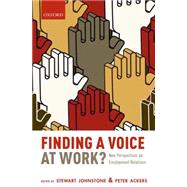Finding a Voice at Work? New Perspectives on Employment Relations
, by Johnstone, Stewart; Ackers, Peter- ISBN: 9780199668014 | 0199668019
- Cover: Paperback
- Copyright: 4/15/2015
Stewart Johnstone, Senior Lecturer in HRM, Newcastle University Business School,Peter Ackers, Professor of Industrial Relations and Labour History, Loughborough University
Stewart Johnstone is Senior Lecturer in Human Resource Management at Newcastle University Business School and has previously been Lecturer in Human Resource Management at Loughborough University. His doctoral research investigated labour management partnership as form of employee voice in the British financial service sector. This has formed a major strand of his research for the last ten years, and he has published several journal articles and book chapters on this theme.He has also published on human resource strategy and human resource management in SMEs. He is currently Principal Investigator of a British Academy/Leverhulme funded project on the Dynamics of Employment Relations in the Recession (2013-2015), and Co-Investigator of an ERSC Seminar Series The Regulation of Work and Employment: Towards a multi-disciplinary framework (2014-2015). His teaching includes undergraduate human resource management and specialist postgraduate employment relations modules.
Peter Ackers is Professor of Industrial Relations and Labour History in the School of Business and Economics at Loughborough University, UK. He studied Politics and Philosophy (PPE, including Sociology) at Lincoln College, Oxford University, followed by an MA in Industrial Relations from Warwick University. His specialist teaching is in International Employment Relations, British Social History and Business Ethics. Peter's intellectual interests centre on the sociological and historical aspects of the employment relationship and how this affects ordinary people and society at large. His work stresses the moderate, constructive character of organized labour, with themes of partnership and pluralism, and challenges Radical and Marxist theories of Industrial Relations.
Foreword, Mike Emmott (CIPD)
1. Introduction: Employee Voice: The Key Question for Contemporary Employment Relations, Stewart Johnstone & Peter Ackers
PART ONE: KEY CONCEPTS
2. Frames of Reference & Worker Participation, Edmund Heery
3. An Employment Relations Model of Employee Voice, Bruce Kaufman
4. Voice & Employee Engagement, David Guest
5. Voice & Workforce Diversity, Anne-marie Greene
PART TWO: UNION VOICE - COMPETING STRATEGIES
6. Trade Unions as Professional Associations, Peter Ackers
7. Union organizing as an alternative to Partnership. Or what to do when employers can't keep their side of the bargain, Melanie Simms
8. The case for Workplace Partnership, Stewart Johnstone
PART THREE: EUROPEAN MODELS & VARIETIES OF CAPITALISM
9. Social partnership in devolved nations: Scotland and Wales, Peter Samuel and Nick Bacon
10. Employee Participation in Germany: Tensions and Challenges, Michael Gold & Ingrid Artus
11. The Promise of European Works Councils: 20 years of Statutory Employee Voice, Andrew Timming & Michael Whittall
12. The EU Information and Consultation Directive in liberal-market economies, Tony Dobbins & Tony Dundon
PART FOUR: LOOKING AHEAD
13. Making Voice Effective: Imagining Trade Union responses to an era of post-Industrial Democracy, Richard Hyman
The New copy of this book will include any supplemental materials advertised. Please check the title of the book to determine if it should include any access cards, study guides, lab manuals, CDs, etc.
The Used, Rental and eBook copies of this book are not guaranteed to include any supplemental materials. Typically, only the book itself is included. This is true even if the title states it includes any access cards, study guides, lab manuals, CDs, etc.
Flag Review
Digital License
You are licensing a digital product for a set duration. Durations are set forth in the product description, with "Lifetime" typically meaning five (5) years of online access and permanent download to a supported device. All licenses are non-transferable.
More details can be found here.






